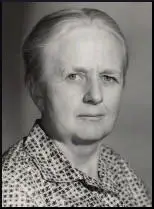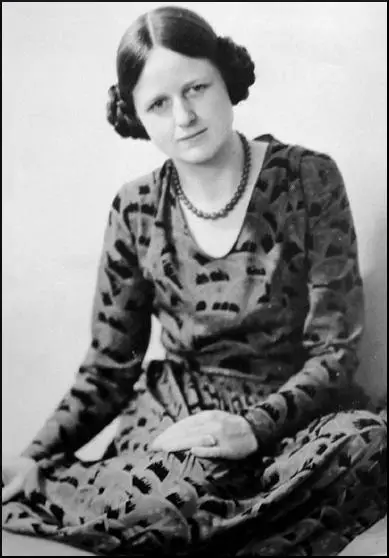Joan Robinson

Joan Maurice (Robinson), the third child in the family of one son and four daughters of Major-General Sir Frederick Maurice and his wife, Helen Maurice, was born in Camberley on 31st October 1903. Her great-grandfather was Frederick Denison Maurice, the Christian Socialist. Her biographer, G. C. Harcourt, claims that she "continued the family tradition with distinction, always a rebel with a cause". (1)
Robinson was educated at St Paul's Girls' School, London, and from 1922 at Girton College. While at Cambridge University she came under the influence of Maurice Dobb. He was a member of the Communist Party of Great Britain. According to Phillip Knightley, the author of Philby: KGB Masterspy (1988) "Dobb was probably the first academic in Britain to carry a Communist Party membership card. Without Dobb, communism would never have gained the prominence in Cambridge that it did." (2) He visited the Soviet Union in 1921 and when his train crossed the frontier he said, "how thrilling to be moving across this sacred soil at last." (3)
Maurice Dobb
Other students influenced by Maurice Dobb, included John Cornford, John Bernal, Kim Philby, Guy Burgess, Anthony Blunt, Donald Maclean, David Haden-Guest and James Klugmann. (4) Victor Kiernan later recalled that Dobb's teaching had helped them to understand the development of society: "We felt, all the same, that it could lift us to a plane far above the Cambridge academic level. We were quite right, as the rapid advance of Marxist ideas and influence since then has demonstrated. Our main concerns, however, were practical ones, popularising socialism and the USSR, fraternising with hunger marchers, denouncing Fascism and the National Government, warning of the approach of war. We belonged to the era of the Third International, genuinely international at least in spirit, whey the Cause stood high above any national or parochial claims." (5)

Dobb's friend, Eric Hobsbawm, has argued: "He joined the small band of Cambridge socialists as soon as he went up and... the Communist Party. Neither body was then used to such notably well-dressed recruits of such impeccably bourgeois comportment. He remained quietly loyal to his cause and party for the remainder of his life, pursuing a course, at times rather lonely, as a communist academic." (6) According to Joan Robinson, not all of his students agreed with his political views. A group of "hearties" seized him and threw him "fully dressed into the River Cam" in a futile effort to teach him sense. This happened to Dobb more than once; but his persecutors became bored and eventually left him alone. (7)
Joan Robinson at Cambridge
She obtained second classes (division one) in parts one and two of the economics tripos (1924 and 1925). In 1926 she married Edward Robinson. They had two daughters. She was appointed to an assistant lectureship in economics and politics at Cambridge in 1934, and became a university lecturer in 1937. According to G. C. Harcourt: "Robinson's incisive mind made her a powerful critic; her insight and intuition, whereby she provided logical arguments of great penetration (without the help of modern mathematical techniques), allowed her to make significant contributions across the whole spectrum of economic theory. She also made a special study of the socialist countries, especially China, which she frequently visited. She fervently hoped China would create a society in which not only would poverty be vanquished but also the potential of all its citizens would be realized in an environment of co-operation, hard work, and mutual respect and affection - inevitably, as she was to admit, an impossible dream but not the less noble for that." (8)
As well as Maurice Dobb she was also influenced by Alfred Marshall, Gerald Shove and Richard Kahn. Joan Robinson published The Economics of Imperfect Competition (1933) and Essay on Marxian Economics (1942). During this period she was considered to be the leading expert on John Maynard Keynes and Karl Marx. She has also been praised for "her role in putting Marx's insights back on the agenda of modern economics". Her most important book was The Accumulation of Capital (1956).
It has been claimed that Joan Robinson did not mind upsetting people with her work: "Never one to mince words, possessor of a civilized wit, sometimes bleakly rude, not always fair but always honest, as hard on herself as on those she criticized, Joan Robinson more than any other economist of the twentieth century became a model for progressive radicals, fearlessly following arguments to conclusions no matter how incompatible they proved to be." (9)
Joan Robinson died in Cambridge on 5th August 1983.
Primary Sources
(1) G. C. Harcourt, Oxford Dictionary of National Biography (2004-2014)
In 1926 she married (Edward) Austin Gossage Robinson (1897–1993); he was later professor of economics at Cambridge University and was knighted. They had two daughters. She was appointed to an assistant lectureship in economics and politics at Cambridge in 1934, and became a university lecturer in 1937, reader in 1949, and professor of economics in 1965.
Robinson's incisive mind made her a powerful critic; her insight and intuition, whereby she provided logical arguments of great penetration (without the help of modern mathematical techniques), allowed her to make significant contributions across the whole spectrum of economic theory. She also made a special study of the socialist countries, especially China, which she frequently visited. She fervently hoped China would create a society in which not only would poverty be vanquished but also the potential of all its citizens would be realized in an environment of co-operation, hard work, and mutual respect and affection - inevitably, as she was to admit, an impossible dream but not the less noble for that.
References
(1) G. C. Harcourt, Oxford Dictionary of National Biography (2004-2014)
(2) Phillip Knightley, Philby: KGB Masterspy (1988) page 30
(3) Quoted by Harry Pollitt in Andrew Boyle, The Climate of Treason (1979) page 77
(4) Andrew Boyle, The Climate of Treason (1979) page 47
(5) Victor Kiernan, London Review of Books (25th June, 1987)
(6) Eric Hobsbawm, Oxford Dictionary of National Biography (2004-2014)
(7) Joan Robinson, interviewed for the book, Andrew Boyle, The Climate of Treason (1979) page 47
(8) G. C. Harcourt, Oxford Dictionary of National Biography (2004-2014)
(9) G. C. Harcourt, Oxford Dictionary of National Biography (2004-2014)
